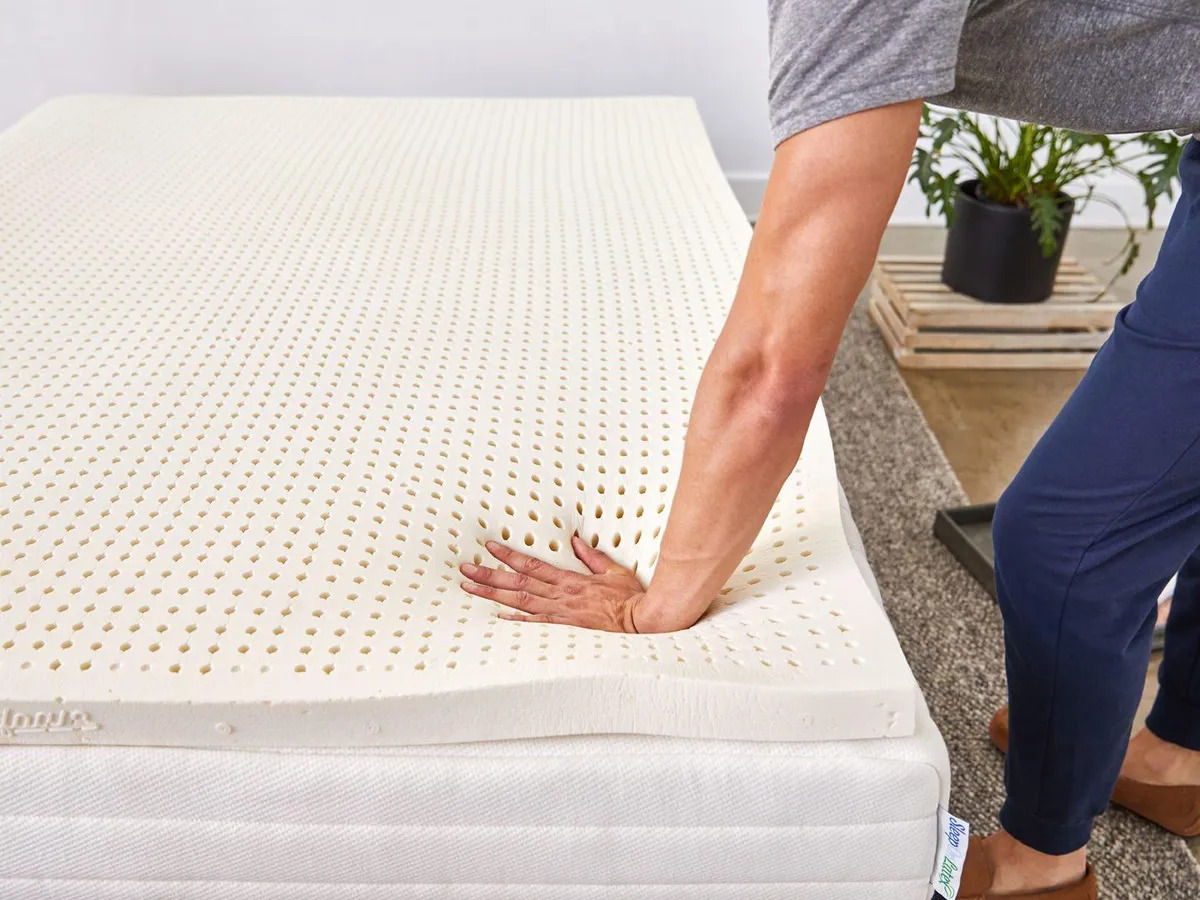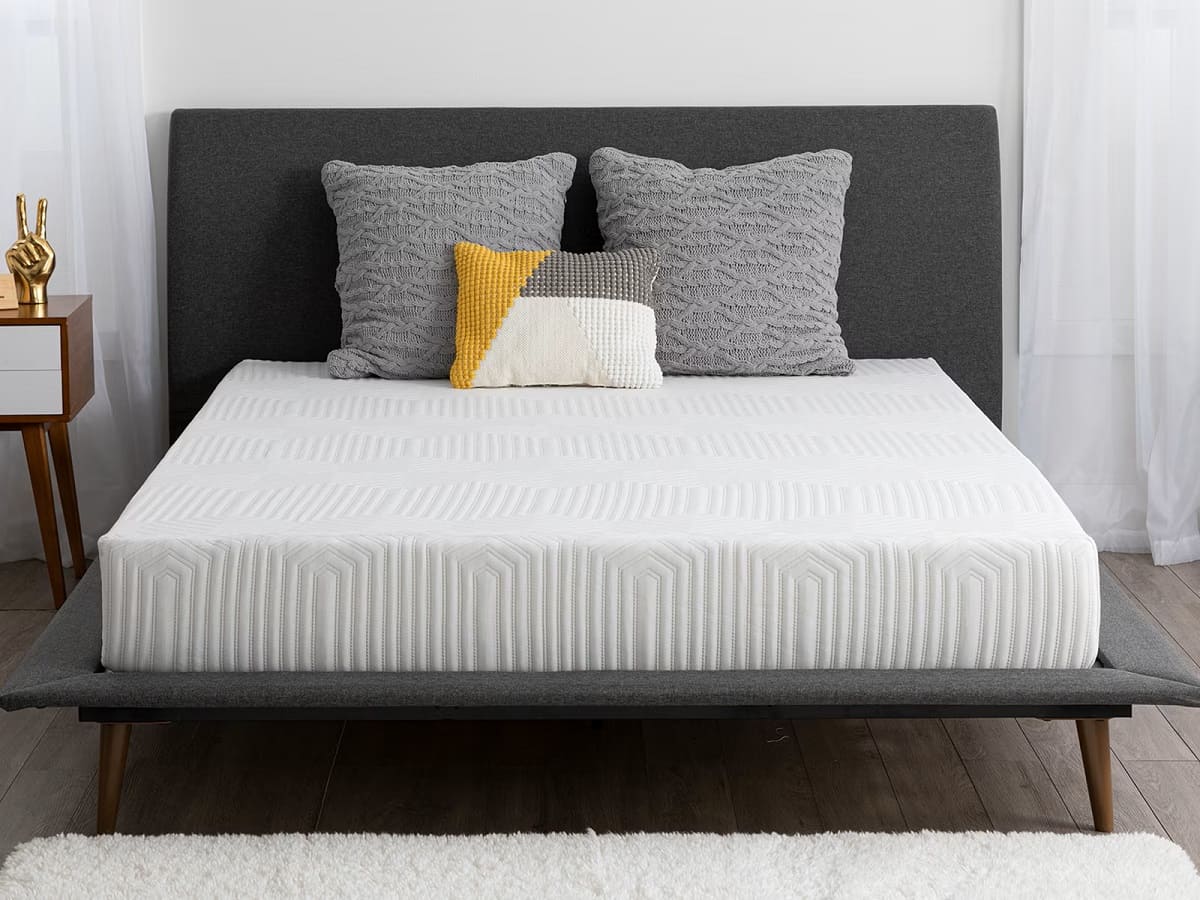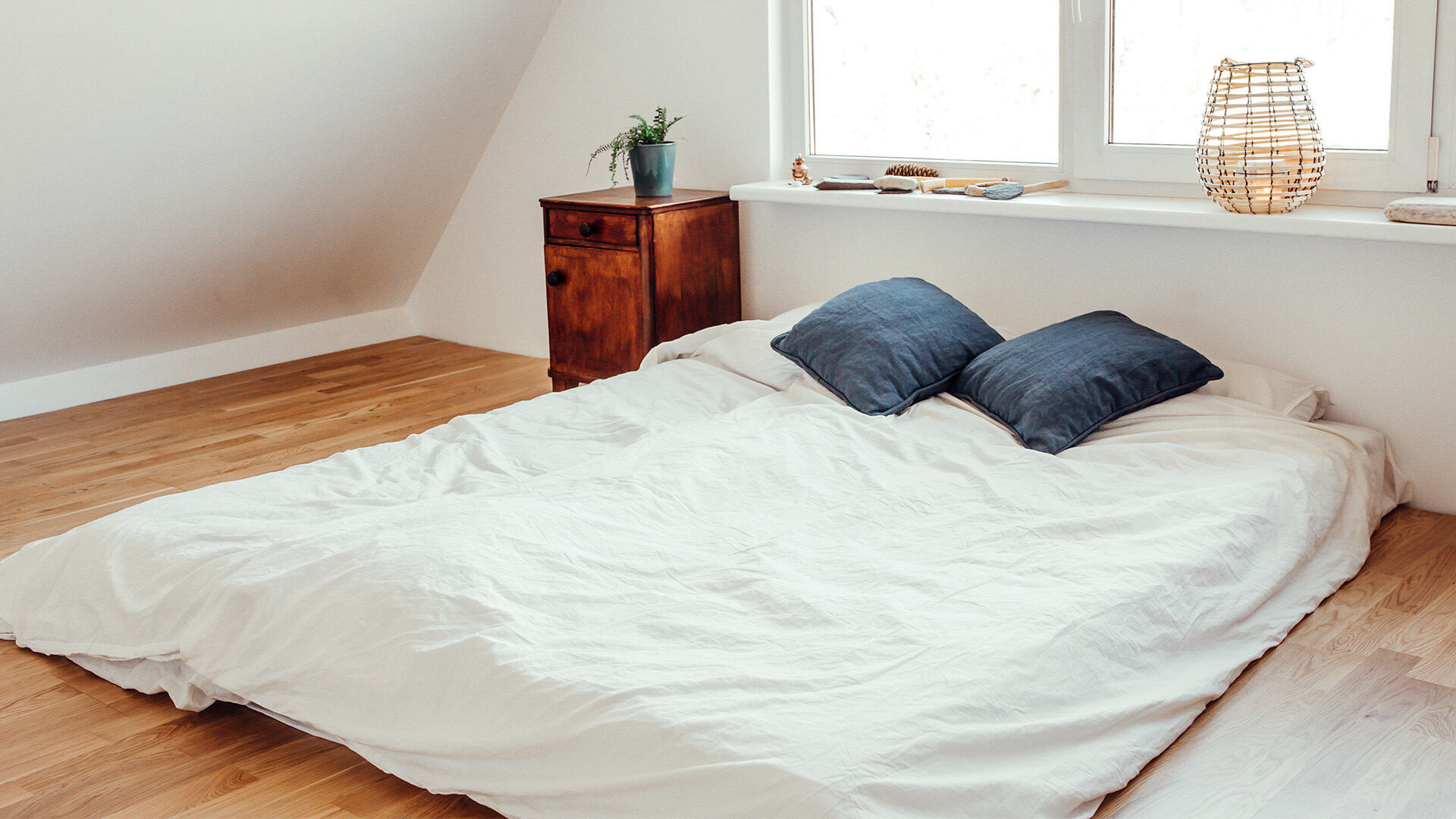Home>Interior Design>Can I Make My Mattress Firmer? We Ask Sleep Experts How


Interior Design
Can I Make My Mattress Firmer? We Ask Sleep Experts How
Modified: November 2, 2024
Can I make my mattress firmer? We ask sleep experts how
(Many of the links in this article redirect to a specific reviewed product. Your purchase of these products through affiliate links helps to generate commission for Storables.com, at no extra cost. Learn more)
Introduction: Importance of Mattress Firmness for Sleep Quality
When it comes to getting a good night’s sleep, the firmness of your mattress plays a crucial role. The level of firmness can significantly impact your comfort, spinal alignment, and overall sleep quality. A mattress that is too firm or too soft may lead to discomfort, restless nights, and even chronic pain.
Sleeping on a mattress with the ideal firmness can provide numerous benefits. It helps promote proper spinal alignment, allowing your body to rest in a neutral position. This can alleviate any pressure on your joints and muscles, reducing the likelihood of waking up with aches and pains.
Furthermore, the firmness of your mattress can also affect your sleep posture. A mattress that is too soft might cause your body to sink in, creating an unnatural curve in your spine, while a too-firm mattress may not contour to your body’s natural curves, causing similar issues. Finding the right level of firmness ensures that your body is properly supported, maintaining a healthy sleep posture throughout the night.
Additionally, the firmness of your mattress influences how well you sleep, especially if you have certain sleep conditions such as sleep apnea or chronic back pain. An overly soft mattress may lead to restricted airflow or inadequate support, contributing to sleep disturbances. On the other hand, a mattress with appropriate firmness can provide the necessary comfort and support, allowing you to sleep more soundly and wake up feeling refreshed.
It’s important to note that mattress firmness is subjective and varies from person to person. What feels comfortable for one individual may be too firm or too soft for another. Therefore, finding the ideal level of firmness requires consideration of personal preferences, body type, and sleep habits.
In the following sections, we will explore the various factors that can affect mattress firmness and discuss methods to alter or adjust the firmness to achieve optimal sleep comfort. By understanding these factors and options, you’ll be better equipped to make informed decisions about your mattress and improve your sleep quality.
Key Takeaways:
- Achieving the perfect mattress firmness is crucial for quality sleep. Factors like material composition and coil gauge impact firmness, and methods like using toppers or adjusting coils can help customize it to your needs.
- If your mattress isn’t the right firmness, consider using a topper, adjusting coil tension, or adding a supportive foundation. Alternatively, explore customizable mattresses or exchange policies to find the perfect level of firmness for a comfortable sleep.
Read more: How Soon Can I Sleep On My Nectar Mattress
Factors Affecting Mattress Firmness
When it comes to mattress firmness, several factors come into play. Understanding these factors can help you choose the right mattress that meets your specific comfort needs. Here are three key factors that significantly impact mattress firmness:
1. Material Composition and Density
The materials used in a mattress greatly affect its firmness level. Different materials have varying levels of support and responsiveness. Here are a few common mattress materials and their firmness characteristics:
- Memory Foam: Memory foam mattresses are known for their contouring capabilities. Depending on the density of the foam, they can range from soft to firm. Higher-density memory foam tends to offer better support and firmer feel.
- Latex: Latex mattresses have a more natural and resilient feel. They tend to be more responsive and offer good support. The firmness can vary depending on the type of latex used, such as Dunlop or Talalay.
- Innerspring: Innerspring mattresses typically have coils that provide support and determine the firmness level. The thickness of the coils, known as the coil gauge, affects how firm or plush the mattress feels. Higher gauge coils result in a softer feel, while lower gauge coils offer greater firmness.
- Hybrid: Hybrid mattresses combine multiple materials, such as memory foam and coils, to offer a balance of support and comfort. The firmness level of a hybrid mattress can vary based on the specific construction and materials used.
2. Coil Gauge and Type
For innerspring mattresses, the gauge or thickness of the coils is a significant factor in determining firmness. Coil gauge is typically measured on a scale from 12 to 15, with lower numbers indicating thicker coils and greater firmness. Higher gauge coils provide more bounce and a softer feel.
In addition to coil gauge, the type of coil system used can also impact firmness. Different coil systems, such as Bonnell coils, continuous coils, or pocketed coils, offer varying levels of support and responsiveness. Pocketed coils, for example, tend to provide better motion isolation and contouring, resulting in a more tailored and adjustable feel.
3. Toppers and Accessories
Mattress toppers and accessories can also affect mattress firmness. Toppers, such as memory foam or latex toppers, can add an extra layer of cushioning and adjust the overall feel of the mattress. A soft topper can make a mattress feel more plush, while a firmer topper can provide additional support and firmness.
Similarly, using a mattress pad or protector can slightly alter the feel of the mattress. Thicker or quilted mattress pads may add a plush or cushioned feel, while thin and waterproof protectors usually have a minimal impact on firmness.
By considering these factors, you’ll be better equipped to find a mattress with the right level of firmness that suits your sleep preferences and needs. Understanding how material composition, coil gauge, and the use of toppers and accessories influence firmness can make your mattress shopping experience more informed and successful.
Can You Make Your Mattress Firmer?
If you find that your mattress is not providing the desired level of firmness, don’t worry. There are several methods you can explore to make your mattress firmer and improve your sleep comfort. Here are three common approaches:
The Role of Mattress Toppers
One simple and cost-effective way to adjust the firmness of your mattress is by using a mattress topper. Toppers come in various materials and densities, allowing you to add a layer of cushioning or support to your existing mattress. If your mattress is too soft, a firmer topper, such as one made of high-density foam or latex, can enhance its firmness. On the other hand, if your mattress feels too firm, a plush or softer topper can provide additional comfort and a gentler feel.
Adjusting Coil Tension or Support Systems
If you have an innerspring mattress, the tension of the coils can be adjusted to modify the firmness level. Some mattresses come with adjustable coil systems that allow you to customize the firmness according to your preferences. This feature can be especially useful for couples who have different firmness preferences. By modifying the coil tension, you can achieve a firmer feel on one side of the mattress while keeping the other side softer, ensuring both partners can sleep comfortably.
In addition to coil tension adjustment, certain mattresses may offer support system customization. For example, some hybrid mattresses come with zoned support systems that provide different levels of firmness in specific areas of the mattress, targeting support where it is needed the most. This allows you to adjust the firmness of your mattress to align with your individual body’s needs.
Adding a Supportive Foundation
Inadequate support from the foundation or bed frame can affect the firmness of your mattress. A weak or sagging foundation can make even a firm mattress feel softer over time. By adding a supportive foundation, such as a sturdy platform bed or a solid box spring, you can ensure proper support for your mattress. The added support can help maintain the intended firmness of the mattress and improve its longevity. Before making any changes to the foundation, consult the manufacturer’s recommendations to ensure compatibility with your specific mattress.
Keep in mind that while these methods can help adjust the firmness of your mattress, they may have limitations depending on the initial construction of the mattress. It is essential to consider the quality and overall condition of your mattress before attempting any modifications. In some cases, if your mattress is significantly worn out or doesn’t meet your needs despite adjustment attempts, it may be time to consider purchasing a new mattress with the desired level of firmness.
Exploring these options can help you find the right level of firmness for your mattress, ensuring a comfortable and restful sleep experience. Consider your personal preferences, consult the mattress manufacturer’s guidelines, and, if necessary, seek advice from sleep professionals to make informed decisions about modifying your mattress.
Expert Opinions on Making a Mattress Firmer
When it comes to modifying the firmness of your mattress, sleep experts offer valuable insights and considerations. Let’s explore their opinions on mattress firmness modification as well as the pros and cons of different methods:
Sleep Experts’ Insights on Mattress Firmness Modification
Sleep experts agree that finding the right level of mattress firmness is essential for optimal sleep comfort. They emphasize the importance of personalized preferences and individual needs when it comes to mattress firmness modification. While some individuals prefer a firm mattress for enhanced support, others may require a medium or softer feel for pressure relief.
Experts also emphasize the role of trial and error in finding the ideal firmness. Each person’s body weight, sleeping position, and specific comfort requirements contribute to their preference for a firmer or softer mattress. Understanding your unique sleep needs can guide you in selecting the right method for adjusting your mattress’s firmness.
Pros and Cons of Different Methods
Experts suggest that using a mattress topper is one of the easiest and most effective ways to modify mattress firmness. Toppers are versatile and allow you to add or remove cushioning as needed. However, they may not address underlying support issues in the mattress.
Adjusting coil tension or support systems can provide targeted customization, ensuring different firmness levels for each side of the mattress. However, not all mattresses offer this feature, and it may require professional assistance to make the adjustments accurately.
Adding a supportive foundation is a practical solution for improving mattress firmness. It helps maintain the intended level of firmness and ensures long-term durability. However, it may not completely change the overall feel of the mattress, especially if the existing mattress lacks proper support or has significant wear and tear.
Considerations for Individual Sleep Preferences and Needs
When considering mattress firmness modification, sleep experts highlight several factors to keep in mind:
- Body Type: Different body types may require varying levels of firmness to achieve optimal support and pressure relief.
- Sleep Position: Your preferred sleep position affects how your body aligns on the mattress, influencing the firmness level that feels most comfortable.
- Existing Mattress Quality: The overall condition and quality of your existing mattress play a role in how effectively it can be modified for firmness adjustments.
- Health Conditions: Certain health conditions, such as chronic back pain or joint issues, may require specific firmness levels to alleviate discomfort and promote better sleep.
Ultimately, sleep experts recommend considering individual sleep preferences and needs when deciding which method to use for adjusting mattress firmness. Experimentation, guided by expert advice, can help you strike the right balance between comfort and support, leading to improved sleep quality and overall well-being.
Alternative Options for Firmness Adjustment
If the methods mentioned earlier don’t provide the desired level of firmness or if you’re looking for alternative options, there are a few additional approaches you can consider. Here are three alternative options for adjusting mattress firmness:
Mattress Exchange or Return Policies
If you recently purchased a mattress and find that it is not the right level of firmness for you, check the retailer’s exchange or return policy. Many mattress companies offer trial periods, allowing you to test out the mattress in your own home. If you’re within the trial period, you may be able to exchange the mattress for a firmer or softer model that better suits your needs. It’s important to carefully review the terms and conditions of the policy to ensure eligibility for an exchange or return.
Replacing Specific Mattress Components
In some cases, adjusting specific components of your mattress can help modify its firmness. Mattresses with removable comfort layers, such as those found in some hybrid or customizable mattresses, allow you to swap out the top layers for ones with different firmness levels. Some manufacturers even offer replaceable inserts or layers that can be customized to your desired firmness. This option provides more flexibility and allows you to fine-tune the firmness of your mattress based on your preferences.
Customizable Mattresses and Personalized Firmness Options
If you’re unable to find the right level of firmness with standard mattresses, you may consider investing in a customizable mattress. Some manufacturers offer mattresses that can be tailored to your specific sleep preferences. These mattresses often come with adjustable firmness options, allowing you to modify the firmness levels on different sides of the mattress or even adjust specific areas for targeted support. Customizable mattresses provide the flexibility to change firmness as your needs evolve, ensuring ongoing comfort.
It’s important to note that alternative options for firmness adjustment may involve additional costs or restocking fees. Additionally, some options may have limitations based on the specific mattress model or brand. Before pursuing these alternatives, thoroughly research the options available, read customer reviews, and consult with the manufacturer or retailer to determine which method is most suitable for your specific situation.
By exploring these alternative options, you can have a greater chance of finding the right level of firmness that suits your preferences and promotes a comfortable sleep experience. Remember to consider factors such as trial periods, compatibility with your existing mattress, and the ability to personalize firmness to make an informed decision.
Conclusion: Achieving the Desired Mattress Firmness
Obtaining the perfect level of mattress firmness is crucial for a restful sleep experience. It can significantly impact your comfort, spinal alignment, and overall well-being. Throughout this article, we have explored various factors, methods, and expert opinions on adjusting mattress firmness. Here is a summary of the key points to consider:
1. Personal Preference and Individual Needs: Mattress firmness is subjective and varies from person to person. It is essential to consider your specific sleep preferences, body type, and any underlying health conditions when determining the ideal firmness level.
2. Factors Affecting Mattress Firmness: Material composition, coil gauge, and the use of toppers and accessories can all impact mattress firmness. Understanding how these factors influence firmness can guide your decision-making process.
3. Methods for Making a Mattress Firmer: You can make your mattress firmer by using a mattress topper, adjusting coil tension or support systems, or adding a supportive foundation. Each method has its pros and cons, and the choice depends on your specific needs and the quality of your existing mattress.
4. Expert Insights: Sleep experts highlight the importance of personalized preferences and trial and error when it comes to mattress firmness. They also emphasize considering factors such as body type, sleep position, and existing mattress quality when deciding how to modify firmness.
5. Alternative Options: If the initial methods do not provide the desired firmness, alternative options include mattress exchange or return policies, replacing specific mattress components, or investing in customizable mattresses with personalized firmness options.
6. Making an Informed Decision: It is crucial to thoroughly research and read customer reviews before making any modifications to your mattress. Consider factors such as trial periods, compatibility, and potential costs to ensure you are making an informed decision.
By taking into account these considerations and expert advice, you can increase your chances of achieving the desired firmness that promotes optimal sleep comfort. Experimentation, awareness of personal preferences, and understanding the available options will guide you towards making the most informed decision for your mattress modification.
Remember, a good night’s sleep is essential for overall well-being, and finding the right level of mattress firmness can greatly contribute to a restful and rejuvenating sleep experience.
Frequently Asked Questions about Can I Make My Mattress Firmer? We Ask Sleep Experts How
Was this page helpful?
At Storables.com, we guarantee accurate and reliable information. Our content, validated by Expert Board Contributors, is crafted following stringent Editorial Policies. We're committed to providing you with well-researched, expert-backed insights for all your informational needs.












0 thoughts on “Can I Make My Mattress Firmer? We Ask Sleep Experts How”